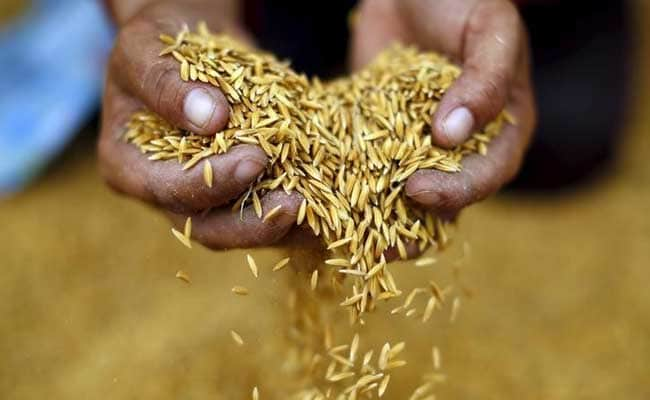
If people devour too much nitrate of their diets, it can intrude with the capability of red blood cells to move oxygen within the frame, the report stated. (Reuters picture)
NAIROBI, KENYA: As they struggle to address greater severe weather, a number food crops areproducing extra of chemical substances that can cause fitness troubles for humans and cattle who eatthem, scientists have warned.
a new document with the aid of the United nations environment Programme (UNEP) says that cropsalong with wheat and maize are producing greater capability pollution as a response to shieldthemselves from intense weather.
but these chemical compounds are harmful to humans and animals if fed on for a extended period of time, according to a report launched in the course of a United countries surroundings meetingmeeting in Nairobi.
“vegetation are responding to drought conditions and increases in temperature much like humans dowhile faced with a stressful scenario,” explained Jacqueline McGlade, chief scientist and director of thedivision of Early caution and assessment at UNEP.
below ordinary conditions, as an instance, plant life convert nitrates they absorb into nutritious amino acids and proteins. however extended drought slows or prevents this conversion, leading to more probablyelaborate nitrate accumulating within the plant, the file stated.
If human beings consume an excessive amount of nitrate of their diets, it may intrude with the capacityof pink blood cells to transport oxygen in the body, the file said.
plants susceptible to accumulating an excessive amount of nitrate in instances of stress encompassmaize, wheat, barley, soybeans, millet and sorghum, it said.
DROUGHT, THEN RAIN
a few drought-harassed plants, when then exposed to sudden big quantities of rain that lead to speedygrowth, in flip collect hydrogen cyanide, more normally called prussic acid, the record stated.
Prussic acid – one of the elements utilized in some sorts of chemical battle – interferes with oxygen glidein human beings. Even quick–term publicity may be debilitating for human beings, McGlade stated.
flowers such as cassava, flax, maize and sorghum are maximum at risk of dangerous prussic acid accumulation, the report said.
cases of nitrate or hydrogen cyanide poisoning in people were pronounced in Kenya in 2013 and inside thePhilippines in 2005, McGlade stated. In Kenya, children died in coastal Kilifi after consuming cassava that had raised stages of prussic acid in it following extreme rainfall, consistent with local media reports.
Aflatoxins, molds which can affect plant plants and raise the risk of liver damage, most cancers and blindness, as well as stunting foetuses and infants, also are spreading to extra regions as a result ofmoving climate patterns as a result of climate exchange, scientists stated.
McGlade said about four.5 billion humans in developing international locations are exposed to aflatoxins every yr, even though the amounts are in large part unmonitored, and the numbers are rising.
“we’re just starting to recognize the importance of toxin- associated problems confronting farmers ingrowing international locations of the tropics and sub-tropics,” the document referred to.
“As hotter climate zones increase toward the poles, nations in extra temperate regions are facing new threats,” it added.
In 2004, Kenya suffered excessive outbreaks of aflatoxin poisoning, which affected greater than 300 peopleand killed greater than 100 following a extended drought, in step with the international livestock studiesInstitute.
EUROPE AT hazard
The UNEP report said Europe might be at growing risk from aflatoxins in domestically grown crops ifglobal temperatures rise by means of at least 2 stages Celsius. the world is presently on a course to agreater than three diploma Celsius temperature rise, scientists believe.
An growth in poisonous compounds in crops is likely to impact closely on the arena‘s health machine,which can be already struggling with the effects of food insecurity, Dorota Jarosinska of the sectorhealth employer‘s european middle for surroundings and fitness stated in an interview with the Thomson Reuters foundation.
Alex Ezeh, government director of the African population fitness and research middle, stated the boom inpollutants in vegetation became a massive issue.
“poisonous plants can result in neurological sicknesses among people however the best project is theoccurrence of cancer,” he said in an interview.
The record proposes a listing of eight thoughts farmers and agricultural professionals can adopt to try and limit damage from greater crop pollution, consisting of mapping contamination hotspots andbuilding better evidence about what’s occurring now with the pollution in their area.
Scientists additionally endorse that developing crop types designed to address excessive climate ought to assist reduce the ranges of toxic chemical compounds in meals.
“research centers with the Consultative organization on international Agricultural studies are developingseeds which are appropriate in numerous regions which have been hit by using climate change,” McGlade stated.
© Thomson Reuters 2016
